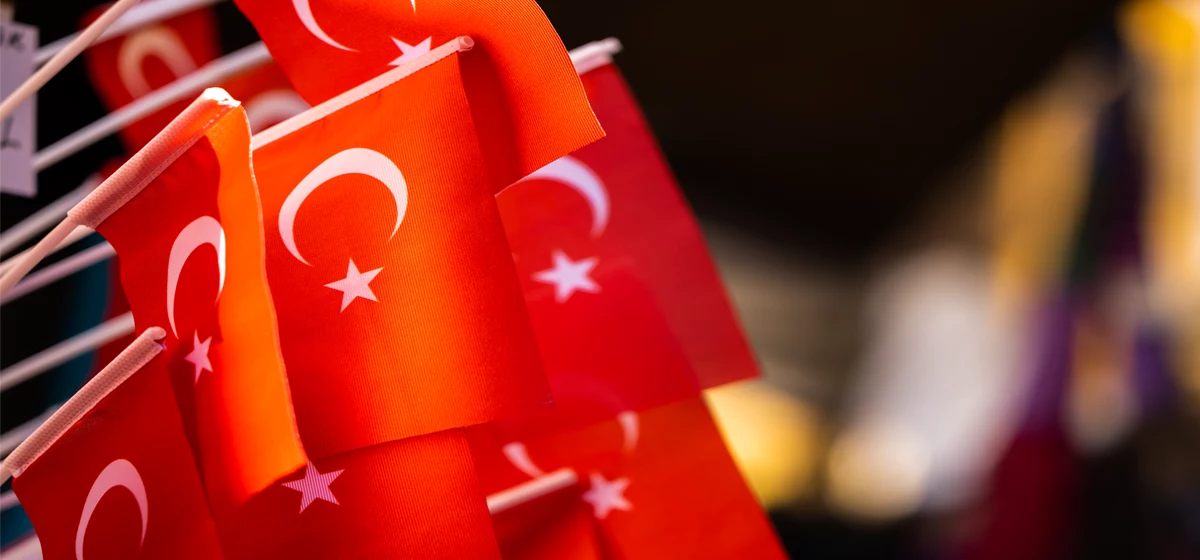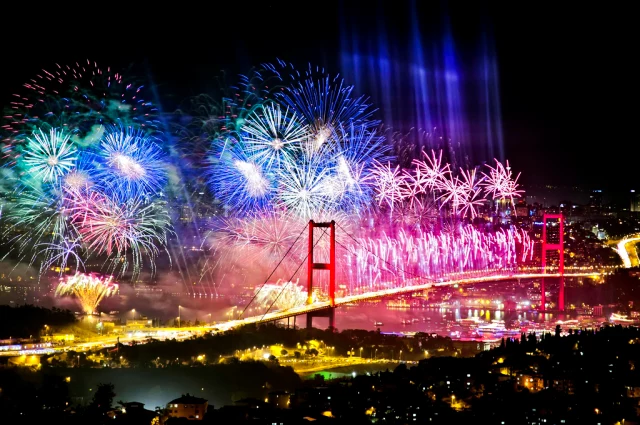National and Religious Holidays in Turkey

Before planning a holiday in Turkey, paying attention to national and religious holidays would be helpful. There is only one day off on national holidays and Turkish people generally prefer to spend these days at home with their families. But religious holidays (Ramadan and Eid al-Adha) range from 3 to 5 days, and sometimes the holiday is extended to 1 week by the government. Religious holidays change each year and move forward 11 days each year.
In Turkish culture, there is a tradition of visiting relatives on religious holidays. The little ones go to the homes of their elders and celebrate the feast. Some Turks use these times for vacation and go to holiday regions such as Antalya, Bodrum, Fethiye, and Marmaris and have a summer vacation.
You can learn more about Turkey by reading why should you visit Turkey article?
How many days are there public holidays in Turkey in 2023?
There is a religious holiday for 3 days, Eid-al-Fitr, 4 days, for a total of 7 days. National holidays are 8 days in total on different days. For 2023, there are 15 days of public holiday in Turkey.
Is it possible to go to tourist areas during religious holidays?
Since there will be a Turkish density in tourist areas during the holidays, accommodation fees may be up to twice the normal. In addition, you may encounter crowds of people on the roads and at destinations, you plan to visit (beaches, ancient cities, etc.).
If you have not yet understood how to travel to Turkey, we recommend that you look for other date options, taking into account the religious holidays.
Do Banks Work on National and Religious Holidays?
Unfortunately, banks will be closed as these days are public holidays. You must make your transactions via ATM or internet banking.
Do Exchange Offices Work on National and Religious Holidays?
Exchange offices are generally closed on the first and second days of religious holidays. But that doesn’t mean they will all be closed. In particular, the exchange offices located inside the shopping center may be open. On national holidays, they all work.
Do Museums Work on National and Religious Holidays?
Yes, only the first day of religious holidays is closed until 13:00 and you can visit all museums after 13:00. Museums are free on holidays.
Every museum in Turkey is closed one day a week, regardless of holidays. Before visiting the museum, we recommend that you call the museum and ask. For example, Istanbul Topkapi Palace Museum is closed every Tuesday.
How is Public Transportation Provided on National and Religious Holidays?
During holidays, public transportation is usually free on the first day. But this may vary from city to city. Because public transport is free, people travel a lot and it can be crowded.
Especially in Istanbul, locations such as Eminönü, Sultanahmet, Beyoğlu, and Taksim will be very crowded. You may want to spend time in alternative locations during the holidays.
I’m coming for the New Year’s holiday. What should I pay attention to?
Turkey is a good option for New Year’s holidays. You can buy a nice all-inclusive new year package for cheap prices at five-star hotels in holiday regions such as Antalya, Bodrum, Marmaris, and Fethiye.
If you want to spend the New Year in Istanbul, we recommend nightclubs on the European and Anatolian sides of the Bosphorus. The party continues until the morning and in the first minutes of the new year, there is a unique fireworks show on the Bosphorus.
If you want to spend New Year’s Eve on the street in Istanbul, you should be a little careful. In particular, malicious people can go to popular locations such as Istiklal Street and Nisantasi; and unfortunately, there have been some harassment incidents in the past.
For these reasons, there are many formal and plainclothes police in these areas, and if you are uncomfortable, you can quickly go to the police and ask for help, or if you behave in a way that shows your discomfort, plainclothes police will come to you quickly.
Although there are not many incidents due to extensive security measures, it may be good to save the 155 police emergency number on your phone.
If you are thinking of traveling to Istanbul, do not forget to take a look at the Istanbul Tourist Guide.

What should I pay attention to on May 1, Labor Day?
There are 1 May celebrations and marches in the squares of big cities. There have been some sad events in the past and extensive security measures are being taken. There have been no problems in recent years, but it would be good to stay away from crowded places.
Demonstrations are taking place in Taksim, Nişantaşı, Kadıköy, and Beşiktaş districts in Istanbul. Today, we recommend you visit districts such as Sarıyer, Beykoz, Üsküdar, and Sultanahmet.
Holidays in Turkey due to years
2023 public holidays
- New Year’s Holiday (Yılbaşı Tatili) – January 1
- Ramadan Feast (Ramazan Bayramı) – 21, 22, 23 April
- National Sovereignty and Children’s Day (Ulusal Egemenlik ve Çocuk Bayramı) – April 23
- Labor and Solidarity Day (Labor Day) – 1 May worker’s day
- Commemoration of Atatürk and Youth and Sports Day (Atatürk`ü Anma ve Gençlik ve Spor Bayramı) – 19 May
- Eid-al-Adha (Kurban Bayramı) – 28, 29, 30 June and 1 July
- Democracy and National Unity Day (Demokrasi ve Milli Birlik Günü) – 15 July
- Victory Day (Zafer Bayramı) – August 30
- Republic Day (Cumhuriyet Bayramı) – 29 October
2024 public holidays
- New Year’s Holiday (Yılbaşı Tatili) – January 1
- Ramadan Feast (Ramazan Bayramı) – 10, 11, 12 April
- National Sovereignty and Children’s Day (Ulusal Egemenlik ve Çocuk Bayramı) – April 23
- Labor and Solidarity Day (Labor Day) – 1 May worker’s day
- Commemoration of Atatürk and Youth and Sports Day (Atatürk`ü Anma ve Gençlik ve Spor Bayramı) – 19 May
- Eid-al-Adha (Kurban Bayramı) – 16, 17, 18, 19 June
- Democracy and National Unity Day (Demokrasi ve Milli Birlik Günü) – 15 July
- Victory Day (Zafer Bayramı) – August 30
- Republic Day (Cumhuriyet Bayramı) – 29 October
National Holiday Celebrations
The meanings of Turkey’s national holidays.
New Year’s Eve – January 1
With the decision taken in 1935, the first day of the new year is a public holiday.
National Sovereignty and Children’s Day – April 23
It is a holiday gift to all children of the world by Mustafa Kemal Atatürk on April 23, 1921, due to the opening of the Turkish Grand National Assembly.
Labor and Solidarity Day (Labor Day) – 1 May
Celebrated almost all over the world, this holiday has been a public holiday in Turkey since 2009.
Commemoration of Atatürk and Youth and Sports Day – 19 May
It is the day when Mustafa Kemal Atatürk, who set out by ferry from Istanbul to start a popular resistance in occupied Turkey during the First World War, set foot in Samsun and started the War of Independence. It has been celebrated as a public holiday since 1935.
Democracy and National Unity Day – 15 July
Every July 15th has been designated as a public holiday to commemorate the citizens who lost their lives in the military coup attempt on 15 July 2016.
Victory Day – 30 August
The War of Independence, which started on May 19, is the day when the Great Offensive (Büyük Taaruz) victories ended on August 30, 1922. This day has been celebrated as Victory Day since 1926 and especially military parades are held on this day.
Republic Day – 29 October
It has been celebrated as a public holiday since October 29, 1925, the anniversary of the founding of the Republic of Turkey. It is one of the most important national holidays.
Religious Holiday Celebrations
Turkey celebrates Islamic holidays. The meanings of these holidays;
Feast of Ramadan
Since Turkish society is generally Muslim, religious holidays are given great importance. Ramadan holiday is known as “Ramazan” in Turkish.
The month of Ramadan is determined according to the Hijri calendar and starts 11 days earlier each year compared to the previous year. Muslims fast for 30 days and do not eat or drink anything from dawn to sunset during these 30 days. The last meal of the day is eaten with the morning prayer and its Turkish name is “sahur”. In the evening, as the sun sets, the daily fast ends, and the meal is eaten. This hour is called “iftar”.
This year, about 15 hours a day fasted, and these 30 days are considered holy days.
At the end of 30 days, there is a celebratory Ramadan Feast and it lasts for 3 days. In Turkish traditions, baklava is made at home to serve guests. Candy, chocolate, baklava, and cologne are offered to the guests. Minors have a tradition of visiting elders.
Many Turkish citizens go to holiday areas and take a summer vacation to make use of family visits and vacation time. Since these regions will be crowded, you will be more pleased to evaluate your Turkey holiday on other days.
For more information about Ramadan, you can check Wikipedia.
Eid-al-Adha (eid qurban)
Eid al-Adha is 67 days after Eid al-Fitr. In Turkish, it is known as the “Kurban Bayramı”. It is celebrated 11 days earlier than the previous year, as in the Ramadan Feast.
Eid-al-Adha is celebrated in Islam to thank God for the blessings he has given, and animals such as sheep and calves are slaughtered and shared with those in need. The purpose of this tradition is for the rich to help the poor. In addition to sacrificing animals, money donations called “fitre” are made to those in need. The fitra fee to be paid is determined by the religious institution. It has been determined as a minimum of 1200 TL for 2022.
Eid-al-Adha holidays are extended by 4 but 1 week by the government to take holiday. Therefore, it is the period when tourism regions are the most crowded. It may be up there to live like our beach and normalize transportation, and it is a suffocating crowd like the ancient city.
For more information about Eid-al-Adha, you can check Wikipedia.
FAQ About Turkey Holidays
Which religious holidays are celebrated in Turkey?
In Turkey, Ramadan (known as Ramazan or Şeker Bayramı) and Eid al-Adha (Kurban Bayramı) is celebrated.
Which is the longest holiday in Turkey?
Turkey’s longest holiday is Eid al-Adha, which is a religious holiday. The date of Eid al-Adha changes every year and is celebrated as a public holiday for 4.5 days in total. A holiday for up to 1 week can be declared by state decision.
What is Turkey’s religion?
99% of the population in Turkey is Muslim. 75% are Sunni, 11% are Alevi, 5% are Shafi, and the remaining 11% are from other sects. Even so, conservatives only make up 15 percent of the population and 85 percent are truly modern.
Do the Turkish celebrate Christmas?
Christmas has no place in the Islamic faith and the Turks do not celebrate Christmas, but they celebrate the new year and there are celebrations across the country on 31 December. The entertainment centers are completely full and the Turks decorate the houses and celebrate with their friends, and there is a traditional belly dancing show on television.
Is Sunday a holiday in Turkey?
Yes, Sunday is a public holiday. With exceptions, private firms, Banks, and government offices do not work on Saturdays and Sundays.
Do they drink alcohol in Turkey?
Yes, alcohol consumption is surprisingly high in Turkey. Alcohol is not allowed to be sold in markets after 10 pm, but you can buy it from bars or discos. There are no prohibitions or restrictions on alcohol consumption. Turks generally do not prefer to consume alcohol during religious holidays and Ramadan.
Look at!
Is it Safe to Travel to Turkey in 2023 ?
Budget Friendly Istanbul Tourist Guide: 7 Secret Travel Tips
Top 10 Things To Do in Cappadocia
Complete Bodrum Vacation Guide
Complete Izmir Itinerary
Complete Guide Pamukkale Travertines
One Day in Antalya
Turkey area code and city area codes
Frequently used Turkish words for tourists
You can also get to know Turkey better with our sim card in Turkey, the National flower of Turkey, Turkish Learning Resources, and Istanbul city card articles.
